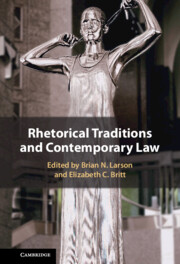Vasileios Adamidis is an Associate Professor of Law at Nottingham Trent University, UK. He has written in the field of legal history and rhetoric, especially in the context of Athenian democracy, identifying intersections between ancient and modern concepts and practices.
Jennifer Andrus is Professor of Writing and Rhetoric Studies at the University of Utah. Her work has primarily consisted of analyses of discourses circulating in the intersections between domestic violence, law, and law enforcement.
Elizabeth C. Britt is Professor of English at Northeastern University. She is a feminist rhetorical theorist and critic whose research focuses on legal rhetoric. She has written most recently about domestic violence advocacy and legal education as rhetorical education.
M. Kelly Carr is Associate Professor of Communication at the University of West Florida. Her research explores the nexus of law and public discourse, primarily as implicated through Supreme Court opinion writing. She is the author of The Rhetorical Invention of Diversity: Supreme Court Opinions, Public Argument, and Affirmative Action (2018).
Laura J. Collins is Assistant Professor of English at the University of Colorado, Colorado Springs. Her research focuses on legal rhetorics and their relationship to political advocacy. She has written about the Second Amendment and antidiscrimination law.
Judy M. Cornett is the College of Law Distinguished Professor at the University of Tennessee College of Law, where she teaches Law and Literature. Her published work includes rhetorical analyses of eighteenth-century British novels, Harper Lee’s To Kill a Mockingbird, and opinions of the Tennessee Supreme Court.
Rasha Diab is Associate Professor of Rhetoric and Writing at the University of Texas at Austin. Her work centers on the rhetorics of peacemaking, Arab(ic)-Islamic rhetorics, feminist rhetorics, and revisionist historiography. She is the author of Shades of Ṣulḥ (2016), which explores the cultural, legal, and political dimensions of Arab(ic)-Islamic rhetorics of reconciliation.
Erin Leigh Frymire is Senior Lecturer in Rhetoric and Writing and Co-director of the Global Health Humanities Gateway program at Trinity College in Hartford, CT. Her work focuses on rhetorics of law and the body, as well as developing pedagogical strategies for cultivating empathy and for teaching rhetoric in nontraditional spaces.
Mark A. Hannah is Associate Professor of English at Arizona State University. He has written broadly about the relationship between law and rhetoric, applications of rhetoric in the professions, and rhetorics of multidisciplinary communication. He is a co-author of Law and Rhetoric: A Primer (2024).
Lindsay Head is Assistant Professor of Law at Jacksonville University College of Law. She centers her research on the intersections of rhetoric, culture, and law. Her recent work examines cultural influences on Fourth Amendment jurisprudence and interrogates notions of authorship in legal discourse.
Brian N. Larson is Research Fellow, Arts and Humanities Fellow, and formerly Associate Professor of Law at Texas A&M University School of Law. His scholarship focuses on legal argumentation and its rhetorical, logical, and cognitive dimensions.
Francis J. Mootz III is Professor of Law at McGeorge School of Law at the University of the Pacific. He has written extensively about the relevance of hermeneutics and rhetoric to legal theory. He is author of Rhetorical Knowledge in Legal Practice and Critical Legal Theory (2006).
Susan Tanner is Associate Professor of Law at Brandeis School of Law at the University of Louisville. Her scholarship is focused on law and language, with particular focus on privacy and technology law, using methods that range from computational linguistics to traditional rhetorical and legal analyses.
Laura A. Webb is Professor of Law, Legal Practice at the University of Richmond School of Law. She has written about legal education as well as the intersection of classical rhetoric and contemporary law.

